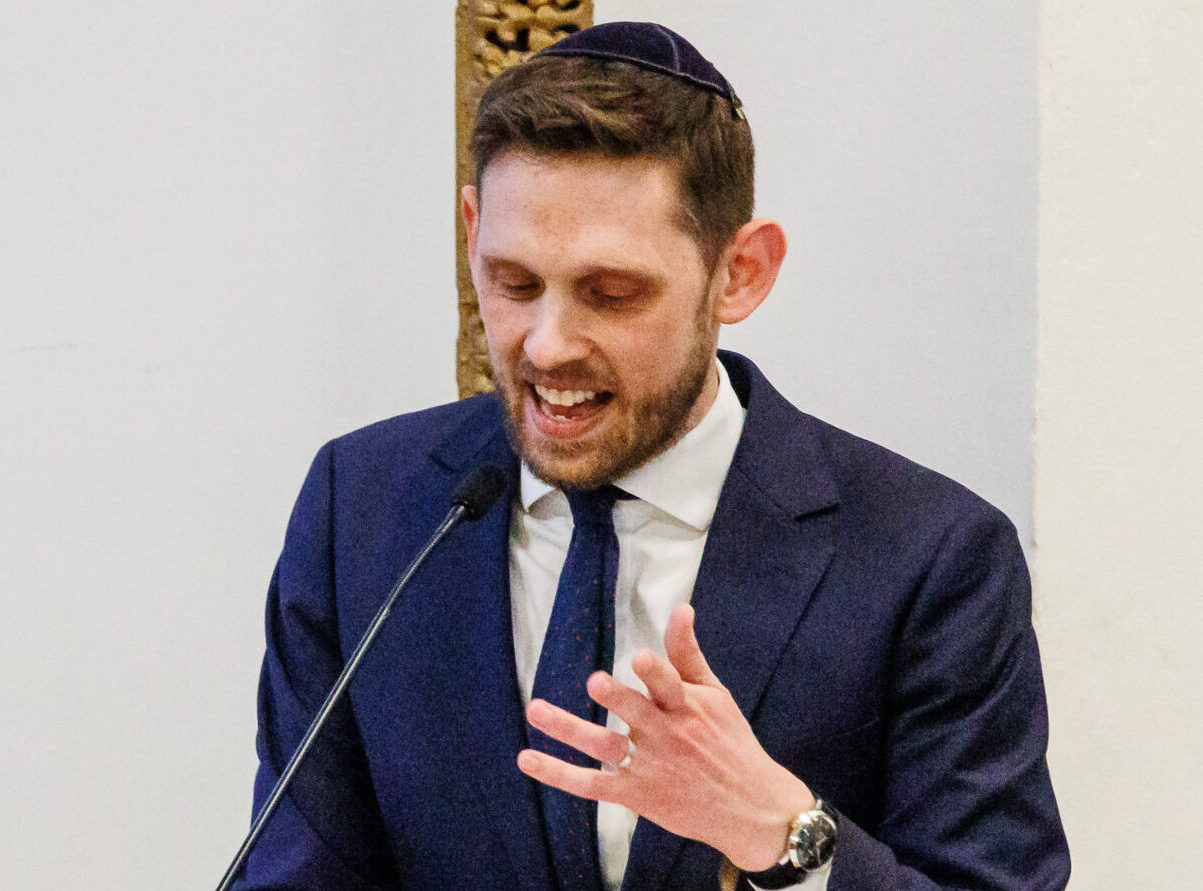I’m thrilled you are exploring Society Hill Synagogue and have found your way to the page of Divrei Torah, words of Torah, which are part of a generations-long Jewish practice of refracting sacred Jewish teachings through the light of our own day and age.
For me, Judaism is an opportunity to nourish ourselves, grounded in the Jewish story: a story that has unfolded throughout the generations, with twists and turns, tragedy and triumph, serving as a source of life to those who engage with it.
The Jewish People are known as B’nei Yisrael: the people who wrestle with the Divine. The name comes from that moment in our tradition in which it is understood that our ancestor Jacob “wrestled with a figure,” a figure understood to be a manifestation of that very Divine Being (see Genesis 32).
That moment produced a legacy of sacred wrestling; grappling; seeking to make meaning of, and find purpose in, our time on earth.
These Divrei Torah are my efforts, in conversation with the community of Society Hill Synagogue, to make meaning and to find purpose, seeking to serve this community, our broader world, and the Divine.
I hope you find meaning in them yourself, and I encourage you to reach out to me if you would like to discuss their contents or to discuss becoming a part of the Society Hill Synagogue community. Welcome!
Do you want to recieve Rabbi Kamesar’s
Divrei Torah in your inbox each week?
Subscribe Now!


The Lost Touch
This past Shabbat during services, we collectively studied Parashat Tetsaveh, the Torah portion known as Tetsaveh, which means “You [Moses] shall instruct.” The portion falls in the last third of the Book of Exodus as Moses remains with God at Mt. Sinai, gathering instructions for the Israelites with

Getting in the Right Headspace
This past week during Shabbat services, we discussed the weekly torah portion, Terumah. Terumah means “gifts” and it refers to the gifts that the Israelite people were called upon to bring so that, collectively, they could facilitate the construction of the mikdash, “sanctuary,” from the word for holiness, or,

Did Anyone Ever Teach You How to Pray? (Also, Blessings and Babies)
Tonight I want to talk about the thing that has been happening all around us this evening: prayer. Prayer is paradoxically extremely central to Jewish life—it is in some ways the central activity that happens at any Jewish event: a Shabbat service, holidays, a lifecycle

Revelation: Not Just a One Time Thing?
This past Shabbat we studied Parashat Yitro, the Torah portion in the Book of Exodus known as Yitro, named after Moses’ father-in-law, Jethro, who witnesses the intense burdens Moses is under, navigating the many disputes of the Israelites, and helps him organize a system of judges

A Bat Mitzvah’s Teaching on Questions
This past weekend, for the second Shabbat in a row, we were fortunate to celebrate a beautiful Bat Mitzvah. Talia and her family celebrated in the sanctuary, on the Society Hill Synagogue Bimah, where multiple generations of this family have now become Bat Mitzvah. Talia’s parashah (Torah

Continued Response to the Events in Colleyville, TX
As Jews and people in Jewish community, we have become far too accustomed to headlines, and a history, marked by the experience of Jews being targeted for our religious expression, for our heritage, for simply being different. It is deeply painful. It shouldn’t be that

A Bat Mitzvah’s Teaching on Impressionability; And Reflections on Isolating with a Toddler
What a lovely Shabbat we spent this past weekend as we celebrated Talia’s Bat Mitzvah. Talia’s Torah portion was Bo, the third portion in the Book of Exodus, which picks up in the midst of the ten plagues with God telling Moses “Bo el Paroah,” meaning, essentially,

Response to the Tragic Fire in Philadelphia
The news out of another part of our community yesterday was wretched: twelve people dead, eight of whom were children, as a result of a fire in a house on the 800 block of North 23rd Street in the Fairmount neighborhood of Philadelphia, a mere

Finding a Middle Path to Forgiveness
This past week we celebrated Jonah’s Bar Mitzvah. What a joyous occasion it was. Jonah’s Torah portion was Miketz. Miketz means, at the end. Whether this is referring to the end of the two years that our ancestor Joseph spends in prison before he is released, or the

Remarks from Hanukkat Mezuzah — Building Dedication Ceremony
I’d also like to share with you the remarks I offered at our Hanukkat Mezuzah, our modest Building Dedication Ceremony on Sunday, in the hopes that they help lay out for us an intention as we occupy our newly revamped spaces, including the Paula Kline Learning

Who’s Directing What?
This past week we studied Parashat Vayeshev, the Torah portion known as Vayeshev, which means “He [Jacob] dwelled.” The Torah portion begins with Jacob having settled down as the scene shifts to the lives of his twelve sons, most notably Joseph, to whom, as the eldest

Breaking Up Time Is A Sacred Act
Happy Thanksgiving! Don’t worry (if you were): I’m not writing this email on Thanksgiving; I’m spending time with my family. That’s the beauty of the “schedule send” function that is now so common in email services. But this topic of creating space away from work

What Got You Here Won’t Aid You There?
This past Shabbat we studied Parashat Vayetzei, the Torah portion known as Vayetzei, in the middle of the Book of Bereshit (Genesis), chronicling the formative episodes of our ancestors as they develop from a family into a nation. The Torah portion picks up with our ancestor Jacob leaving (Vayetzei comes

A Bar Mitzvah’s Reflections on Abundance and Scarcity
This past Shabbat, we celebrated the Bar Mitzvah of Aldo. Aldo’s parashah (Torah portion) was Toldot. Toldot literally means something like “lineage;” it is related to the common Hebrew words yeled and yaldah, which mean boy and girl, respectively, and which come from the root י-ל-ד, which means to give birth. In

We Have… Two Souls, Sometimes?
I wanted to share a version the remarks I shared this past Shabbat, at our first TGIShabbat in over twenty months. That evening, as on all Friday evenings, we sang the words v’shamru v’nei yisrael et hashabat “The Israelite people shall keep Shabbat… For in six days
